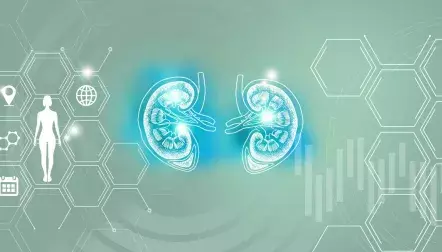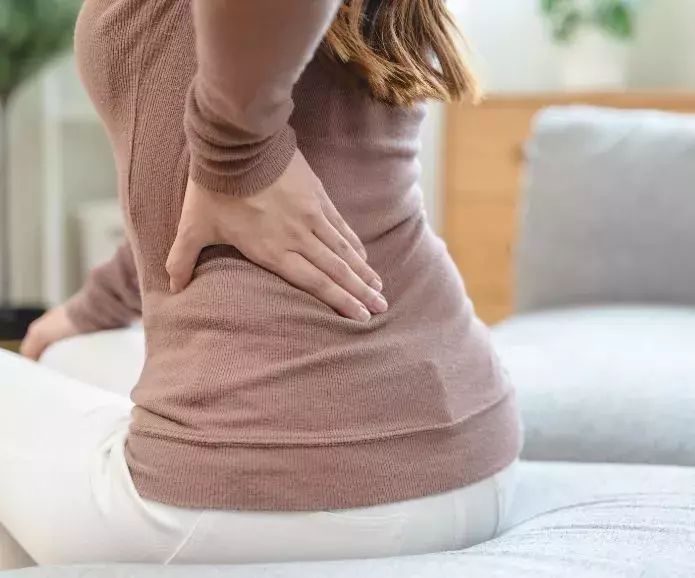
Kidney pain: Why they hurt and when to seek care
- Medically reviewed by
- Shahzia Lakhani
- Last updated
- May 13, 2025
Answers and Actions You Can Count On
Learning about kidney problems can be overwhelming. Join our online kidney community today for guidance, support and solidarity from the American Kidney Fund.
Kidney pain can have many causes. It may be a sign of an infection, injury or another health problem, such as kidney stones. People often confuse kidney pain with back pain, so it's important to talk to your doctor to find out what is causing your pain and what treatment is best for you.
Where do I feel kidney pain?
You feel kidney pain near the middle of your back, just under your ribcage, on each side of your spine where your kidneys are. Your kidneys are part of the urinary tract, the organs that make and remove urine from the body. (pee).
You may feel kidney pain on one or both sides of your back. Pain in these areas doesn't always mean something is wrong with your kidneys. Because there are muscles, bones, and other organs around your kidneys, it can be hard to tell what is causing your pain.
What does kidney pain feel like?
Kidney pain often feels like a dull ache that gets worse if someone gently presses on that area. While it is more common to feel kidney pain on only one side, some health problems may affect both kidneys and cause pain on both sides of your back. One-sided pain is more common and can be linked to a kidney stone, infection, or injury. Pain on both sides may happen with conditions that affect both kidneys, like a severe infection or polycystic kidney disease.
Kidney pain affects everyone, but the cause can vary. Women are more likely to get kidney infections due to a shorter urethra, the tube that carries urine out of the body, while men may be more prone to kidney stones or prostate-related symptoms. The feeling of pain is generally similar for both.

Kidney pain vs. back pain
Because of where your kidneys are, it’s easy to confuse kidney and back pain. How can you tell the difference?
Kidney pain:
- Is felt high on your back and deep in your body
Feels dull - Can happen on one or both sides
- Will likely not go away when you shift your body or rest
Back pain:
- Is usually felt in your lower back
- May shoot down one leg
- Feels more like a stabbing pain
- Gets worse when you do certain activities, like bending over or lifting something heavy
- May ease when you shift your body or rest
What causes kidney pain?
In addition to not having enough water in your body, there are many different causes of kidney pain, including:
Kidney stones are one of the most common causes of kidney pain. Kidney stones form when waste in your blood builds up and sticks together inside your kidneys, creating small, hard clumps. Small kidney stones may move through your urinary tract and come out with your urine. Larger stones, however, can be very painful to pass and you may need surgery to remove them.
Kidney infections are caused by bacteria or other organisms that usually spread to your kidneys from another part of your urinary tract, for example, if you have a urinary tract infection. Women are more likely to have kidney infections because of a shorter urethra, making it easier for bacteria to travel to the bladder. If you think you have a kidney infection, call your doctor — it needs to be treated right away to help prevent kidney damage.
Sometimes, your kidneys can get hurt through trauma, if you have a fall, an accident, or during sports like football, boxing, or soccer. Pain from a kidney injury could be mild or very strong, depending on how badly your kidneys hurt. Kidney injury, also known as kidney trauma or kidney bruising, is different from acute kidney injury.
Kidney cancer may not cause any pain or other symptoms early on. As the cancer progresses, you may notice pain that does not go away in your side, back, or belly. You may also have a fever or blood in your urine. However, these symptoms do not always mean you have kidney cancer — many other health problems can also cause these symptoms.
Polycystic kidney disease is a genetic condition that causes cysts (growths filled with fluid) to grow in your kidneys. These cysts make the kidneys much larger than they should be and can cause pain in your back or side.
Urinary tract infections (UTIs) are caused by bacteria or yeast in your urinary tract and can cause pain when you urinate (pee). Most UTIs happen in the bladder and the urethra. UTIs can also cause a fever and the need to urinate often.
Was this resource helpful?
When should I call my doctor?
Depending on what's causing your kidney pain, you may also have other symptoms. Some could mean you have a serious kidney problem. Call your doctor right away if you have any of these symptoms along with kidney pain:
- Fever
- Blood in your urine
- Pain when you urinate
- Body aches or chills
- Tiredness
- Feeling sick to your stomach or throwing up
How is kidney pain treated?
Treatment for kidney pain depends on what is causing it. If you are experiencing kidney pain, it is important to call your doctor. They may run tests to help understand what is going on, such as:
- A urine test to check for signs of infection or blood
- Imaging tests, such as an ultrasound or CT scan, to see if your kidneys are affected
Once you know what is causing your pain, your doctor can work with you to find the right treatment.
Once your doctor identifies the cause, they can recommend the right treatment. This may include antibiotics for an infection, medicine to manage kidney stones, or other therapies based on your diagnosis.
In the meantime, there are a few things you can do at home to help manage the pain:
- Stay hydrated by drinking water unless your doctor has given you fluid restrictions
- Use a heating pad on your lower back for temporary relief
- Take over-the-counter pain relievers, such as acetaminophen, like Tylenol, unless your doctor tells you to avoid them
- Rest and avoid heavy lifting or intense physical activity
These steps may help ease discomfort, but they do not treat the underlying issue. If your pain gets worse, or you have other symptoms like a fever or blood in your urine, seek medical attention right away.

Know Your Cause®
Kidney pain can be a symptom of several underlying health conditions, some of which can lead to chronic kidney disease if not treated early. Visit our Know Your Cause® page to explore common causes of kidney disease, including kidney stones, infections, high blood pressure, and more. Learning the cause is the first step to getting the right care and protecting your kidney health.
Together, We Can Help Everyone Find Answers
When someone searches "kidney pain" or "blood in urine," they are often scared and looking for facts and reassurance. Your gift to the American Kidney Fund helps make sure these trusted resources are here 24/7, and helps patients get the care and support they need. 96 cents of every dollar donated goes directly to patients and programs.

